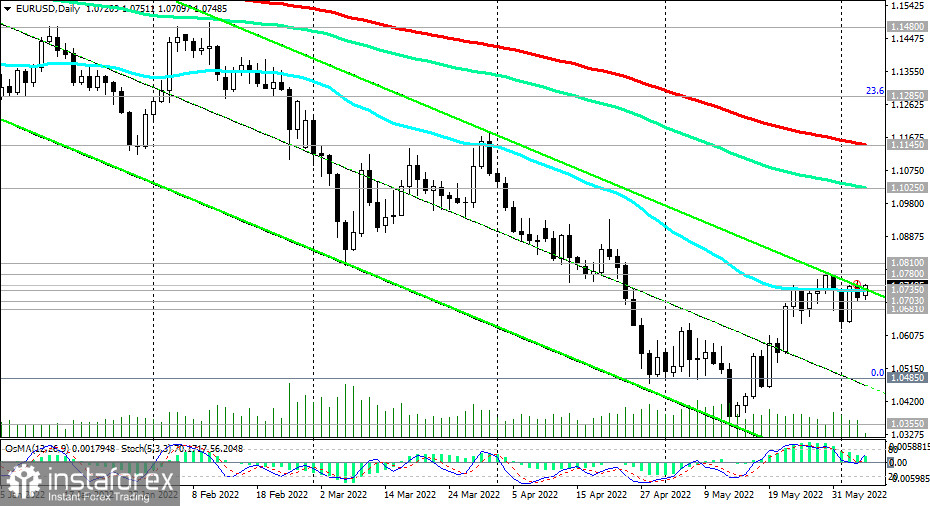The dollar retreats at the beginning of a new trading week, and the dollar index DXY declines. DXY futures at the time of publication of this article are trading near the 101.90 mark, 26 points below the closing price last Friday, when the dollar received support from the publication (at 12:30 GMT) of the report of the US Department of Labor.
As follows to this report, in May, 390 thousand new jobs were created in the United States (outside the agricultural sector), which turned out to be better than the forecast for growth of 325 thousand jobs. The previous value (for April) was revised to 436 thousand from 428 thousand.
Although unemployment in the United States remained at the same level of 3.6%, and Americans' salaries continued to grow (by +0.3%), this is a very decent result, indicating the continued improvement in the American labor market, which is a positive factor for the dollar. As you know, when determining the parameters of its monetary policy, the Fed focuses (among other things) on 3 key indicators: GDP, inflation, and the state of the labor market. A strong report on the labor market becomes another argument in favor of long positions on the dollar because it increases the likelihood that the Fed's gradually tightening monetary policy will continue. At the same time, market participants will now assess how successful the Fed's policy is in terms of curbing inflation in the US, which has reached 40-year highs. The probability that the Fed will raise the interest rate by 0.50% again at the meetings in June and July is approaching 100%. And this is already, for the most part, taken into account in the prices and quotes of the dollar. But it is still unclear what measures the Fed will take to curb inflation at the September jam. The Fed's leaders may pause to assess the effectiveness of the measures taken.
Today, in most European countries, Catholics celebrate the "Day of the Holy Spirit". Banks in several European countries are closed, and trading volumes will be minimal. The publication of important macro statistics is also not expected today - there are no strong drivers on the market.
Therefore, the current weakening of the dollar since the beginning of today's trading day looks more like a correction after its strengthening last Friday.
The main European currencies also strengthened today against the dollar. In particular, the EUR/USD pair has grown by 25 points today, once again attempting to break through the important resistance level of 1.0735.
Nevertheless, in our opinion, until Thursday, when the next ECB meeting will take place, the growth of EUR/USD will be limited by the resistance levels of 1.0780, and 1.0810. But Thursday may be a turning point for the dynamics of EUR/USD. At 11:45, the ECB's decision on the rates (main and deposit) will be published, and at 12:30 (GMT), the ECB press conference will begin, which will be of the greatest interest to investors.
During the press conference, ECB President Christine Lagarde will explain the bank's decision on rates and probably outline the prospects for the central bank's monetary policy in the coming months. Recently, the ECB leadership has been increasingly sounding signals about the need to tighten monetary policy. "Probably, we (at the ECB) will be able to leave negative rates behind by the end of the third quarter," Lagarde said in May at one of the events of the World Economic Forum in Davos, also confirming that the APP program (emergency quantitative easing program) will end at the very beginning of the third quarter, and "if inflation stabilizes by at a level of about 2% in the medium term, a gradual further normalization towards a neutral rate will be appropriate. The ECB will take all necessary steps for this."
If Lagarde again gives similar "hawkish" signals, then even if there are no changes in the ECB's monetary policy at this meeting, the euro may strengthen sharply. The soft tone of the statements and the tendency to continue the soft policy of the ECB, which remains one of the softest (along with the Bank of Japan and the Swiss National Bank) among the world's largest central banks, will harm the euro.
 Tiếng Việt
Tiếng Việt 
 Русский
Русский English
English Bahasa Indonesia
Bahasa Indonesia Bahasa Malay
Bahasa Malay ไทย
ไทย Español
Español Deutsch
Deutsch Български
Български Français
Français 中文
中文 বাংলা
বাংলা हिन्दी
हिन्दी Čeština
Čeština Українська
Українська Română
Română

